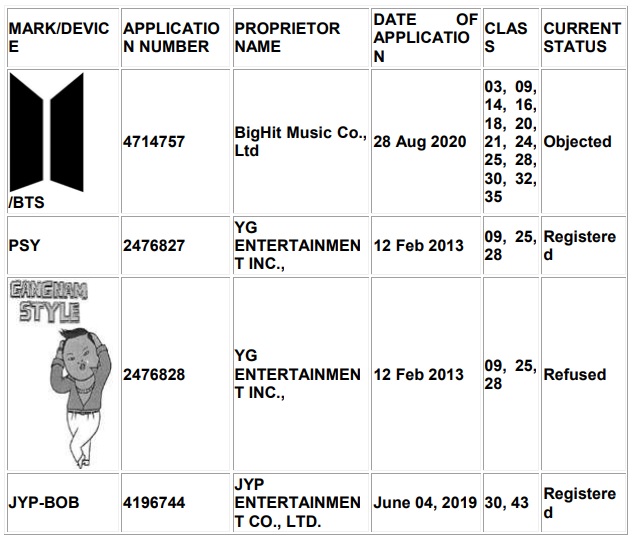- within Strategy and Real Estate and Construction topic(s)
While KPOP has been around since 1992, it was PSY's 2013 global hit Gangnam Style (Oppa is Gangnam style!) which for many, propelled KPOP into the mainstream. Currently, the KPOP industry has evolved into a whopping 5 billion dollar industry. Names like BTS, BLACKPINK, 2PM, etc., are at the tips of the tongue of billions now! With fans all over the world, the demand for KPOP related merchandise has naturally scaled hitherto unknown and unimaginable heights. From bags, clothing items and even computer parts and accessories, the official merchandise of KPOP bands covers all sorts of objects. However, another industry that is simultaneously growing at an equally fast pace is that of unauthorized or counterfeit K-POP merchandise.
To combat this growing menace, the Korean Intellectual Property Office (KIPO) has joined forces with the Korea Music Copyright Association (KMCA) and has announced their intent to carry out large scale crack-downs to catch illegal sellers dealing in counterfeit merchandise, online. While KIPO has a history of carrying out such clamp-downs, the last one being in the year 2020, where they successfully initiated action against close to 8,000 online cases, this time they plan to carry out the same at a much larger scale, in three phases.
To aid with the investigations, several prominent Korean media houses such as S. M. Entertainment (famous for artists like Super Junior and Shinee), JYP Entertainment (of 2PM and TWICE fame) and YG Entertainment (Blackpink being their most famous product) have been prompt in submitting a consolidated list of their registered trademarks, thereby enabling the authorities to monitor and identify violations.
The protocol followed in the said investigations usually involves a thorough inspection of the source of merchandise available online. In the process, authorized sellers and their authenticity is validated while unverified, illegal sellers and distributors are taken down.
Challenges
Even though the initiative was welcomed wholeheartedly, KMCA's policy & law lab Chief Director Kim Hyun-sook in an interview, also drew a picture of the number of hindrances encountered by them while uprooting counterfeit goods. Not to discredit the solid contribution of a remarkable USD 4.9 billion by the KPOP industry towards the Korean economy, he did mention the bittersweet part of the industry being a global sensation – the myriad of fans!
The KPOP industry has garnered fans from all across the globe and from all ages and avenues of life. In fact, the Korea Foundation, which is affiliated with the Korean Ministry of Foreign Affairs recently drew up a rough estimate of the existence of approximately 89 million KPOP fans across 113 countries across the globe.1 With majority of the fans falling in the Gen-Z age range, i.e. 10 to 25 year olds, Mr. Hyun-sook explained how they are most susceptible to falling prey for counterfeit merchandise being sold online.
Inexperience aside, young fans, especially the strata that is yet to be financially independent, often tend to give in to fake merchandise, owing to the cheap price-tags that come along, amongst other things. Other times, it is the fraudsters/counterfeit sellers who have all the tricks up their sleeves sufficient enough to fool even the most prudent consumer to fall in the trap of counterfeit goods.
Given the global outreach, another hurdle faced by the Korean authorities includes the clamping down of counterfeit merchandise that is floating beyond their geographical boundaries. While the scope is not impossible conquer, however, tracking down such merchandise and initiating action against them comes with its own set of practical, logistical and jurisdictional issues.
In any case, these steps taken by Korean authorities are essential in preserving the rights of local talents arising from their homeland, as there evidently is an imminent need for there to be an end to the flow of counterfeit goods in the market, with simultaneous steps to be taken to mobilise the consumer and create awareness about the consequences of acquiring counterfeited goods.
Government Setting up
Given the rather conspicuous contribution of the K-POP industry towards the Korean economy, it is a wise move by the government to take matters into their hands and acting on taking the initiative to protect the intellectual property of the industry. This move warrants exclusivity of original merchandise floating in the market and is a step towards ensuring that the Korean economy is the sole beneficiary of their local talent.
However, this exclusive treatment may also call for unwanted backlash from other entities, who may voice their concerns against the special treatment and support from the Government authorities only for counterfeits pertaining to KPOP. While the same has not happened yet, this step may be viewed in bad light by other entities holding IP rights, who are also equally contributing to the Korean economy with their businesses.
Indian Border Protection- To combat Counterfeiting
Today, with a view to combat counterfeits, many countries have successfully set up systems with their respective Customs Departments to trace the inflow of counterfeit items and seize them at entry points itself.
In India, any entity may register the details of their intellectual property rights (provided they are registered!) with the Customs Office, requesting them to keep a track of consignments that consist of unauthorized products which incorporate their registered intellectual property, on their behalf.
If and when a consignment consisting of suspicious counterfeit products comes to the notice of the Customs Office/Officer, the said consignment is detained and a notice is sent to the concerned business entity, inter alia apprising them of the existence of such a consignment and further indicating a time period2 within which the business entity may visit the Customs Office for inspection of the said goods.
In the event of no response from the concerned business entity, the subject consignment is either released or confiscated for destruction. The fate of the consignment is determined provided all other conditions of import of such goods under the Customs Act, 1962, have been complied with.
India being a fairly dense with sasaeng(s)3, popular media agencies like BigHit Entertainment, S M Entertainment and Y G Entertainment have been in the process of in building their IP portfolio in India as well, majorly either through the mechanism set up by the Madrid International Trademark System or by way of directly filing applications with the Indian Trademark Registry. Time is to tell how these entertainment giants will wade their fishnets to secure their IP rights in India and strategize their portfolios to initiate necessary action. Details of some of the trademark applications have been tabulated below:

Conclusion
Counterfeit goods pose as menace globally, and the need to track them down has increased considerably. Seeking for help from Customs Offices may be one of the avenues to tackle counterfeits that are floating through import/export consignments, however, with the advancement of technology and e-commerce, the time is now ripe for coming up with new effective methods to track such goods down, that are ever-so-freely available for sale online. The initiative taken by the Korean authorities is definitely a powerful start, however, time is to tell how their strategy would be upgraded in order to effectively manage/take down counterfeits at the global scale.
Other countries may wish to follow suit by identifying key contributors to their respective economies (like how Korea identified KPOP), and take proactive measures to safeguard their rights, so as to essentially protect and nurture the economy.
Footnotes
2. 5 working days for general goods; 3 working days for perishable items
3. Korean term for KPOP Fans
For further information please contact at S.S Rana & Co. email: info@ssrana.in or call at (+91- 11 4012 3000). Our website can be accessed at www.ssrana.in
The content of this article is intended to provide a general guide to the subject matter. Specialist advice should be sought about your specific circumstances.


